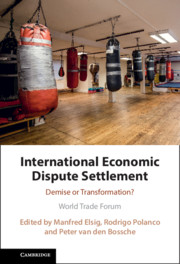Book contents
- International Economic Dispute Settlement
- International Economic Dispute Settlement
- Copyright page
- Contents
- Figures
- Tables
- Contributors
- Preface
- Abbreviations
- 1 Introduction
- 2 Contracting v. Multilateralism in Global Economic Governance
- Part I Current Challenges in International Trade Dispute Settlement
- 3 Sausage-Making at the WTO
- 4 Operationalizing MPIA Appeal Arbitrations:
- 5 Re-Designing the WTO Mediation Mechanism
- 6 Adjudication vs “Frontier Justice” in International Economic Law Disputes
- 7 WTO Dispute Settlement: “Will of the Strongest” or “Rule of Law”? Attempting to View Recent U.S. Actions through the Proper Lens
- Part II Current Challenges in International Investment Dispute Settlement
- Part III New Issue Areas and Dispute Settlement
- Part IV Regional Approaches for International Economic Dispute Settlement
- Index
- References
7 - WTO Dispute Settlement: “Will of the Strongest” or “Rule of Law”? Attempting to View Recent U.S. Actions through the Proper Lens
from Part I - Current Challenges in International Trade Dispute Settlement
Published online by Cambridge University Press: 07 August 2021
- International Economic Dispute Settlement
- International Economic Dispute Settlement
- Copyright page
- Contents
- Figures
- Tables
- Contributors
- Preface
- Abbreviations
- 1 Introduction
- 2 Contracting v. Multilateralism in Global Economic Governance
- Part I Current Challenges in International Trade Dispute Settlement
- 3 Sausage-Making at the WTO
- 4 Operationalizing MPIA Appeal Arbitrations:
- 5 Re-Designing the WTO Mediation Mechanism
- 6 Adjudication vs “Frontier Justice” in International Economic Law Disputes
- 7 WTO Dispute Settlement: “Will of the Strongest” or “Rule of Law”? Attempting to View Recent U.S. Actions through the Proper Lens
- Part II Current Challenges in International Investment Dispute Settlement
- Part III New Issue Areas and Dispute Settlement
- Part IV Regional Approaches for International Economic Dispute Settlement
- Index
- References
Summary
There is currently a prevailing sense of concern among the World Trade Organization (WTO) community of nations that they are witnessing an ignominious end to a dispute settlement system that has thrived for a quarter century. While the precipitous fall from grace for this treasure of the WTO is certainly the result of a network of factors, the proximate cause is relatively clear: an increasingly antagonistic and aggressive orientation taken by the United States (U.S.) – arguably, the center of gravity of world trade flows – toward the system. While there are many examples of the U.S.’s changed posture, two are particularly notable: (i) the U.S. invocation of the General Agreement on Tariffs and Trade (GATT) Article XXI security exception in defense of a steep increase in steel and aluminum tariffs, and (ii) its active refusal to fill vacated Appellate Body member seats. Each action unto itself is a broadside attack capable of rendering the current dispute settlement scheme obsolete. The two in combination form an aura of inevitability with respect to that outcome.
- Type
- Chapter
- Information
- International Economic Dispute SettlementDemise or Transformation?, pp. 162 - 188Publisher: Cambridge University PressPrint publication year: 2021
References
- 1
- Cited by



